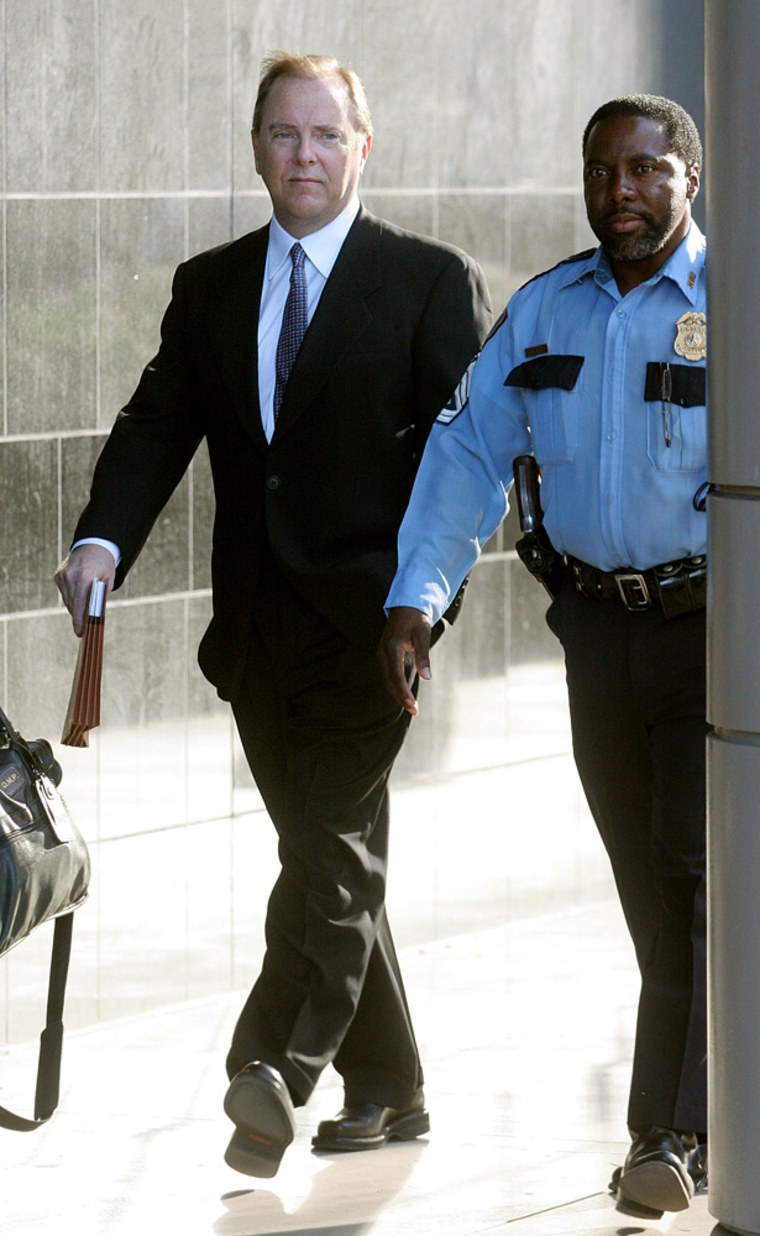A former Enron Corp. executive said Tuesday he and his staff were swept from the company’s risk-assessment squad to another division after former Chief Executive Officer Jeffrey Skilling complained they had acted more like “cops” than deal facilitators.
Vince Kaminski, still evaluating risk for Enron two years later, said he got a cold reaction when he told executives, including company founder Kenneth Lay, that Enron needed to “come clean” on questionable financial structures in the weeks before it crashed into bankruptcy proceedings.
“I felt the company was threatened and I had a duty to speak up,” said Kaminski, who was a managing director of a research unit in the Risk Analytics and Control group, which evaluated deals from divisions across Enron.
But he couldn’t find a receptive ear among Enron’s top ranks, the expert mathematician and economist told jurors in the seventh week of the fraud and conspiracy trial of Skilling and Lay.
Through Kaminski, government prosecutors sought to show Tuesday that the defendants knew one of the company’s top risk assessors voiced concern about the propriety of partnerships run by former finance chief Andrew Fastow to conduct deals with Enron and that they did nothing to intervene.
The defense maintains negative publicity, shattered market confidence and an overall bear market — not overarching fraud — forced Enron to seek bankruptcy protection in December 2001.
The defense is expected to cross-examine Kaminski on Wednesday. His testimony will be followed by that of Sherron Watkins, the Enron executive who sent Lay a memo months before the company’s collapse warning of Fastow’s accounting schemes.
Kaminski’s testimony followed that of Chris Loehr, a former investment analyst with Fastow’s partnerships, who corroborated the ex-CFO’s testimony that the company improperly used the entities to help earnings seem better than they were.
Direct contact
Unlike Loehr, who didn’t even mention Lay or Skilling when questioned by a prosecutor, Kaminski had direct contact with both defendants.
Kaminski said he spoke up in mid-1999 when the first of the partnerships, LJM1, was created to help Enron lock in a gain from an investment in an Internet startup. He disliked the conflict of interest posed by Fastow’s running an entity that conducted deals with Enron and the fact that the entity was funded partly by company stock.
Later, Skilling told Kaminski he’d decided to move him and his group from the company’s risk-assessment staff to the trading division.
“He said my group acted more like cops, preventing people from executing transactions instead of helping them,” Kaminski said.
Kaminski also described a meeting in October 2001 — more than two months after Skilling had abruptly resigned and Lay had resumed as CEO — when he voiced concerns about so-called Raptors, or financial structures backed by Enron stock that were used to lock in investment gains while wiping debt from Enron’s books.
The company was facing increased scrutiny from investors on how it made money through the use of Fastow’s partnerships.
“I said I believed what Andy Fastow did was not only improper, but terminally stupid,” Kaminski testified.
The meeting came a week after Enron posted massive third-quarter losses and a $1.2 billion writedown in shareholder equity related to the Raptors, which had crumbled after Enron stock fell that year.
Kaminski also told executives at the meeting that “coming clean is our best fighting chance,” he said.
But his boss, trading head Greg Whalley, pushed him gently from the podium. Kaminski didn’t describe Lay’s reaction.
The next day, Lay reassured all employees that Enron would survive despite the heat. The company crashed in December that year.
Earlier Tuesday, Loehr could not directly link Skilling to deals because his contact with the company’s top echelon didn’t go that far.
But he described several transactions in which Fastow’s LJM1 and LJM2 partnerships bought whole or part interest in Enron assets, allowing the energy trading company to book earnings.
Loehr, who testified as part of an immunity deal, said Fastow told him Enron gave unwritten assurances it would resell or buy back those interests at a profit. Such actions would mean the deals weren’t legitimate because the partnerships’ investments weren’t at risk.
Loehr didn’t say who gave Fastow the assurances, but the ex-CFO testified last week he got them from Skilling in private conversations he didn’t document.
The investment analyst also said Fastow initially sought to market the Raptors, which were intertwined with LJM2, to other companies, but those efforts shriveled.
“I thought he was crazy,” Loehr said. “This was some of Enron’s dirtiest laundry.”
On cross-examination by lead Skilling lawyer Daniel Petrocelli, Loehr said he didn’t think he was breaking the law.
“I thought I was aiding others in doing that,” Loehr said.
One of the deals Loehr described involved LJM1’s $11.3 million investment in a troubled Brazilian power plant in 1999. Loehr said he initially included in that deal’s paperwork that Enron was obligated to buy back that interest within months. An in-house Enron accountant told him that outside auditors would balk because such a guarantee would mean the deal wasn’t a legitimate sale.
“We removed the language,” Loehr said.
Loehr said in-house Enron accountants knew about undocumented side deals ensuring the LJMs wouldn’t lose money.
“In general, the accountants would say, ’I didn’t hear that, see no evil, hear no evil’ sort of comments,” he said.
Loehr said he quit Enron in August 2001, even though he was in his mid-20s earning an $85,000 salary, because he was uncomfortable with the LJM deals and his role in them. But Petrocelli noted he wrote on exit interview documents that what he liked most about his job were the deals he worked on.
Loehr said he thought the deals were innovative and complex, but “I realized that what we were doing was more window dressing for accounting treatment with side deals.”
